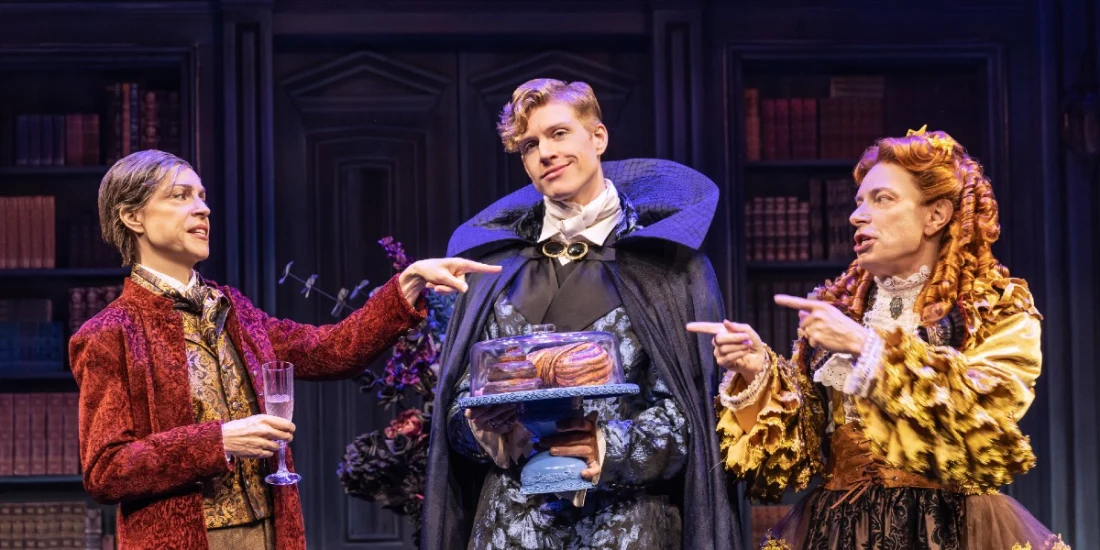'Dracula, A Comedy of Terrors' review — a vampire romp with a bite
Read our review of Gordon Greenberg and Steven Rosen's new play Dracula, A Comedy of Terrors, playing off Broadway at New World Stages through January 7.
Vampires are back en vogue! The Last Voyage of the Demeter, adapted from the Captain’s Log in Bram Stoker’s Dracula, was released in theaters in August, while Netflix premiered Chilean filmmaker Pablo Larrain’s political satire El Conde, which imagines Chilean dictator Augustin Pinochet as a 250-year-old vampire, at the Venice International Film Festival two weeks ago. And now New York gets to bathe in the bombastic bloodshed of Dracula: A Comedy of Terrors, a goofy romp from Steve Rosen and Gorden Greenberg, at New World Stages.
On the one hand, it’s nice to see that there’s still fresh blood in this vampire — as Rosen and Greenberg have him, played dynamically by James Daly (Canada’s Letterkenny), he's reinvented as an egotistical, selfish, emotionally unintelligent Adonis. On the other, the re-emergence of fanged fiction means that we as a society really are drowning in a wave of conservative politics.
Rosen and Greenberg, who co-authored the script while the latter also directs, seem to be aware of ditching the narrative fidelity to the novel in favor of remixing the source material’s target of social critique. If the Victorians were a repressed, sexist, and Machiavellian social order, Dracula: A Comedy of Terrors makes a burlesque of their anxieties and fears. Jonathan Harker (Andrew Keenan-Bolger) is a coward, prissy real estate agent, most fearful of himself; Lucy Westfeldt (Jordan Boatman) is an ambitious botanist relegated to marrying Harker; her father Dr. Westfeldt (Ellen Harvey, maybe miscast) is exploiting the mentally ill in his sanatorium; her sister Mina (Arnie Burton) is horny and desperately unmarried; and even Van Helsing (Burton again) is a woman doctor.
Dracula’s humor exaggerates the tautness between the strictures of social rules and rituals, the archetypes they create, and what happens when they’re transgressed. That kind of observation turned into absurdity feels best embodied by Daly’s Dracula. Daly is unafraid to make his ivory features a liability: he pouts his lips or falls to the ground gracelessly, which makes his performance all the more impressive.
His emotionally adolescent Dracula converges with the play’s attempt at engaging in the more serious business of wanting to liberate oneself from the very societal constraints the characters inhabit. While he’s experiencing an existential crisis in his desire for everything (and thus commitment to nothing), the rest of the ensemble’s desires occasionally come into focus. It’s Boatman who most effortlessly conveys this tonal transition of a woman who is torn between love and a bit of self-reliance and curiosity, but also between the genres Dracula situates itself within, like firecracker comedy and wailing melodrama.
The show makes it difficult to begrudge pointing out the occasional imprecise, maybe, I’ll say it, potentially transphobic “man in a dress” nature to some of the jokes because, after all, it advertises itself as a gender-bending reenvisioning of the text. But the jokes Harvey, who plays Renfield and Dr. Westfeldt, tells have more to do either with insanity or the doctor’s misogyny. Irony, certainly, but not necessarily the same as the joke being about Harvey crossing gender in her performance.
It’s a shame to have to mildly take the show to task because, next to Daly, Burton has the most fun on stage, truly going buck wild with his expressions and gestures, pushing Dracula’s tone to its very limits. But, perhaps that’s the lesson of the Victorians after all: you push too hard against certain boundaries without having a plan for the consequences and get bitten.
Photo credit: Ellen Harvey, James Daly and Arnie Burton in Dracula, A Comedy of Terrors. (Photo by Matthew Murphy)
Originally published on
